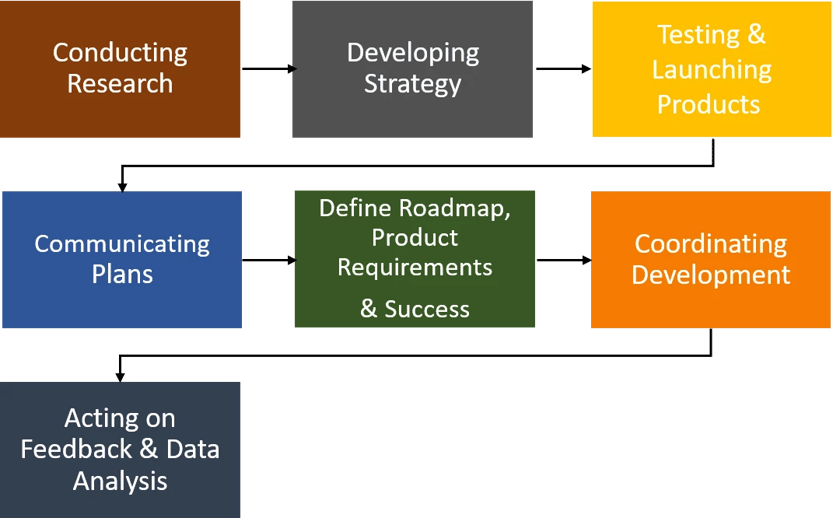Agile vs. Traditional Product Management
Products can help organizations reach higher levels of revenue, growth, and profitability. For generations, companies have been developing and marketing products. Products have made human life much easier. Products have enabled companies to move into multiple geographies beyond their home country.
Given the importance of products, organizations are investing heavily in product management functions. The product management function guides every step of a product's lifecycle. It foresees everything from development, to positioning and pricing, by focusing on the product and its customers first and foremost. It can be defined as a role within a product development team that successfully executes the product lifecycle.
Product managers play a crucial role in rolling out products and experiences for users. They serve at the intersection of engineering teams, user experience teams and provide the glue that holds the shared product vision across these groups together. Most importantly, product managers outline the product strategy and illustrate how it will impact both the customer and the company's goals.
Product managers approach a product by focusing on the following:

Traditional Product Management
Traditional product management uses a methodology where products are developed in a fixed sequential cycle.
This approach puts more emphasis on anticipated product scope, clear documentation, linear processes, and detailed upfront planning.
Some of the benefits of the traditional methodology are clearly defined objectives, controllable processes, clear documentation, and more accountability.
Agile Product Management
Agile product management encourages an adaptive approach to product planning and implementation by using timeboxing tasks, teamwork, and the flexibility to respond to change as quickly as possible.
The Agile framework has four important rules:
- More focus on individuals than processes and tools
- Working software is to be given more importance than comprehensive documentation
- Customer collaboration is vital
- The process should respond to change and be flexible rather than blindly following a plan
Some benefits of enforcing agile product management are flexible prioritization, early and predictable delivery, predictable costs and schedules, improved quality, and more transparency.
Traditional vs. Agile Product Management
Traditional product management falls short in managing many moving parts. Managing a portfolio of products, each of which may be at a different stage of the product lifecycle, requires focus on:
- Sharing cross-functional resources
- Prioritizing value delivery
- Maintaining customer focus
- Creating desired business outcomes
Here is a detailed comparison between Traditional and Agile Product Management
|
Attribute |
Traditional Product Management |
Agile Product Management |
|
Focus |
Minimize upfront risk, maximize control |
Rapid delivery in short iterations |
|
Planning and analysis |
Heavily loaded in the planning and analysis phase |
Distributed over iterations |
|
Authority to approve |
Sponsor |
Product Owner |
|
Applicable situation |
Complex, high cost of failure, well-defined requirements ahead of implementation is possible |
Low cost of failure, requirements amorphous |
|
Typical Model |
Water-fall |
Agile / Iterative |
|
Level of detailing |
High |
Low |
|
Change management |
Formal process through a standardized template Accept change only when justified |
Through prioritized product backlog, time box driven |
|
Communication |
Formal Documented Periodic |
Informal, Verbal, and Frequent |
|
Documentation |
Formal and Prior to implementation |
Through interactions and flexibility. Formal documentation post-implementation for maintenance |
|
Emphasis on requirements prioritization |
Low |
High |
|
Task planning |
Identified first, then divided into tasks |
Deliverables first, then related tasks are identified |
|
Planning and analysis Timing |
Performed in specific phases |
Performed iteratively |
|
Solution definition |
Prior to implementation |
In iterations |
|
Gestation period to go to market |
High |
Low |
Unlike the traditional product management approach, in which the customer is involved only at the start of the development process, agile software development allows customers to get involved at each stage.
This helps in saving costs as improvisations can be made then and there. In traditional software development, many errors and unnecessary expenditures would have happened by the time the project reaches its culmination.
Agile product management spends less time on upfront planning and prioritization. Agile follows iterative processes where product features are divided into sprints of short spans. Therefore, Agile product management is more suited for emerging technology areas. It not only allows greater team collaboration but also paves the way for superior results due to its flexibility.
Want to become an Agile Business Analyst? This is the BEST place to begin your Success journey...
Learn more about AAC Certification Training...
You May Also Like
These Related Stories

Leveraging Business Process Management and Six Sigma

A Practitioners' Guide to Manage Projects Effectively


Comments (1)